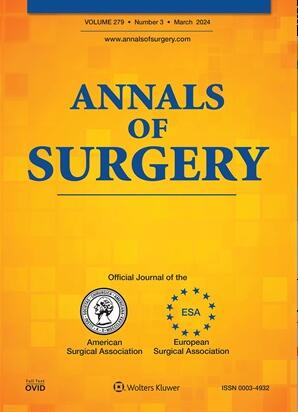Two-Week Course versus Conventionally Fractionated Preoperative Chemoradiotherapy Followed by Total Mesorectal Excision in Locally Advanced Rectal Cancer (Twoarc Trial): A Phase III Randomized Clinical Trial.
IF 6.4
1区 医学
Q1 SURGERY
引用次数: 0
Abstract
OBJECTIVE This phase III randomized trial compared two-week course of preoperative chemoradiotherapy (CRT) with conventional long-course CRT followed by total mesorectal excision (TME) in rectal cancer. BACKGROUND Two-week schedule of hypofractionated radiotherapy with concurrent capecitabine showed favorable tumor response and safety in a previous phase II study. METHODS This study enrolled 338 rectal cancer patients with cT3-4N0-2M0 to receive either standard long-course preoperative radiotherapy (50.4 Gy in 28 fractions over 5-6 wk) or two-week course of radiation (33 Gy in 10 fractions over two weeks) with concurrent intravenous 5-fluorouracil or oral capecitabine. The primary endpoint was downstaging (ypT0-2N0M0) rate. TME was performed 6-10 weeks after the completion of radiotherapy. RESULTS Of 338 patients, 167 received standard long-course CRT and 171 received two-week course of CRT. ypCR was achieved in 26 (15.6%) patients of the standard-course arm and in 25 (14.6%) patients of the two-week-course arm (P=0.807). Downstaging was achieved in 67 (40.1%) patients of the standard-course arm and in 62 (36.3%) patients of the two-week-course arm (P=0.465). Sphincter preservation (91.0% vs. 95.3%, P=0.116) and positive circumferential resection margin (9.0% vs. 14.6%, P=0.109) rates were not significantly different between the two arms. The two-week arm demonstrated significantly lower incidence of grade 2 or higher gastrointestinal toxicity than the standard arm (5.8% vs. 13.2%, P=0.021). CONCLUSIONS This phase III randomized controlled trial suggests that two-week course of preoperative CRT provides comparable tumor response as standard long-course CRT in rectal cancer, with potential advantages of shorter treatment duration and lower gastrointestinal toxicity.局部晚期直肠癌的两周疗程与常规分次术前放化疗后全肠系膜切除术(双弧试验):一项III期随机临床试验。
目的:这项III期随机试验比较了两周的术前放化疗(CRT)与常规的长疗程CRT后全肠系膜切除术(TME)对直肠癌的治疗效果。背景:在之前的一项II期研究中,两周的低分割放疗同时使用卡培他滨显示出良好的肿瘤反应和安全性。方法:本研究纳入338例cT3-4N0-2M0直肠癌患者,接受标准长疗程术前放疗(50.4 Gy, 28次,5-6周)或两周放疗(33 Gy, 10次,2周),同时静脉注射5-氟尿嘧啶或口服卡培他滨。主要终点为降期(ypT0-2N0M0)率。放疗结束后6-10周进行TME。结果338例患者中167例接受标准长疗程CRT, 171例接受两周疗程CRT。标准疗程组26例(15.6%)患者和两周疗程组25例(14.6%)患者达到ypCR (P=0.807)。标准疗程组的67例(40.1%)患者和两周疗程组的62例(36.3%)患者达到了降低分期(P=0.465)。两组间的括约肌保留率(91.0%比95.3%,P=0.116)和阳性环切缘(9.0%比14.6%,P=0.109)无显著差异。与标准组相比,两周组的2级或更高级胃肠道毒性发生率显著降低(5.8% vs 13.2%, P=0.021)。结论本III期随机对照试验提示,术前两周的CRT治疗与标准的长疗程CRT治疗直肠癌的疗效相当,具有治疗时间短、胃肠道毒性低的潜在优势。
本文章由计算机程序翻译,如有差异,请以英文原文为准。
求助全文
约1分钟内获得全文
求助全文
来源期刊

Annals of surgery
医学-外科
CiteScore
14.40
自引率
4.40%
发文量
687
审稿时长
4 months
期刊介绍:
The Annals of Surgery is a renowned surgery journal, recognized globally for its extensive scholarly references. It serves as a valuable resource for the international medical community by disseminating knowledge regarding important developments in surgical science and practice. Surgeons regularly turn to the Annals of Surgery to stay updated on innovative practices and techniques. The journal also offers special editorial features such as "Advances in Surgical Technique," offering timely coverage of ongoing clinical issues. Additionally, the journal publishes monthly review articles that address the latest concerns in surgical practice.
 求助内容:
求助内容: 应助结果提醒方式:
应助结果提醒方式:


